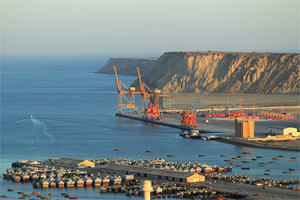
Gwadar Port Expanded Afghan Transit Trade
Gwadar is an emerging foremost maritime gateway, offers Afghan traders a more time – effective and more cost-effective shorter trade route compared to Karachi ports in past. Gwadar is closer to Chaman than the Karachi-Torkham corridor and experiences less traffic congestion. Afghan Transit Trade has arrived at Gwadar Port, the second vessel carrying 20,000 metric tons of Di-Ammonium Phosphate (DAP) fertilizer. International confidence in Pakistan’s port infrastructure indorses commitment to making Gwadar a hub of regional trade. Under the Afghanistan – Pakistan Transit Trade Agreement (APTTA 2010) economic integration with regional connectivity has been improved and Afghanistan’s access to international markets through Pakistan’s deep-sea port. In April 2020, Gwadar Port was first operationalized for Afghan transit trade with the arrival of SIBULK TRADITION carrying 16,000 tons of urea. Pakistan has replaced bank guarantees with insurance guarantees in Afghan transit trade through Gwadar to precisely relief the imports of bulk cargo like DAP, wheat, sugar, and other essential commodities.
|
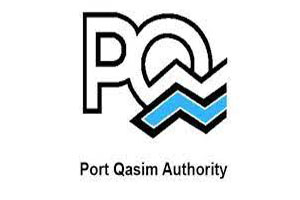
Port Qasim to Endure Maritime Reforms to Support Blue Economy Agenda
The announcement of charges reduction acknowledged government’s commitment and obligation to empowering domestic businesses and unlocking the potential of coastal economies. The Port Qasim Authority has a change to object at strengthening trade competitiveness and supporting the economic reform program and announced a 50% reduction in port charges for exporters in Pakistan. In future, further reforms will continue, like Marine and Aquaculture Policy of Pakistan and an Aquaculture Industrial Zone, both intended to support and provision for sustainable fisheries and marine sector growth with a focus on modernizing port infrastructure, promoting green shipping, and simplifying customs procedures to attract investment and improve Pakistan’s maritime trade footprint.
|
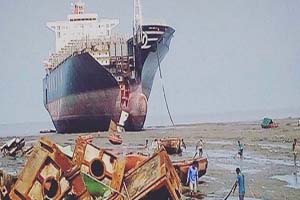
Gadani Transformation into Green Ship-Breaking Yard
The all-inclusive revitalization and renovation of the Gadani Ship-Breaking Yard, to convert into eco-friendly model green facility that aligns Pakistan’s maritime operations and upgrading the yard’s infrastructure and safety systems with international protocols. The confirmation of Rs12 billion for revamp initiative is intended to modernize the ship recycling process with global recycling standards and to boost climate resilience while adhering to global sustainability benchmarks. Social elevate to advantage the workforce and local communities, a 32-kilometer road network, the construction of a 30-bed hospital, residential blocks for medical personnel, and labor colonies, a school, a public park, and modern water supply with treatment systems. The transformation evolves to meet global sustainability standards to reduce pollution, manage hazardous waste responsibly, and contribute to a greener maritime future.
|
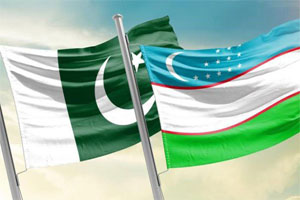
Pakistan, Uzbekistan Maritime Partnership
A landlocked country Uzbekistan and Pakistan to strengthen maritime cooperation and collaboration, highlighted the mounting capabilities of Karachi Port’s infrastructure while emphasizing the potential for mutual cooperation in maritime development and investment potential in blue economy and port infrastructure. The Karachi Port Trust’s (KPT) Transition Management Committee extended full support and briefing to a delegation from Uzbekistan on Comprehensive Coastal Development Zone – CCDZ, the area of 1,600-acre offers considerable investment prospects in infrastructure, tourism, and port expansion. The projects related to clean bulk cargo handling, logistics connectivity, and marine tourism ventures such as scuba diving and jet skiing—demonstrating Pakistan’s commitment to a diversified and sustainable maritime strategy, and its commitment to expanding the blue economy through strategic economic collaboration with Central Asian countries.
|
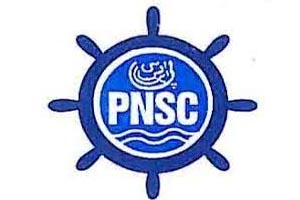
Expansion of PNSC Fleet to 34 Vessels
The PNSC, the country’s sole national shipping company at present operates 10 vessels of various types, with a combined cargo-carrying capacity of 724,643 tons, around 11% of the nation’s cargo volume and 4% by worth. Under the new proposal, PNSC aims to increase these figures to 52% by volume and 43% by value excluding containerized cargo. PNSC concluded a strategy to expand its cargo fleet to 34 vessels and is poised to generate around $700 million in freight earnings in three years. A wide-ranging commercial approach intended to transform maritime and logistics sectors. The importance of transforming it into an internationally competitive, adopting advance technologically including implementing and integrating platforms such as the Pakistan Single Window, Vessel Traffic Management Systems, blockchain-based documentation, and deploying real-time cargo tracking systems all are focused at improving efficiency, transparency with security, and environmentally responsible to adopt green shipping practices, the use of cleaner fuels, vessel retrofitting for energy conservation, adherence to global decarbonization targets organization and aligned with international maritime standards. The business plan accentuates the avail of public-private partnerships to finance the modernization drive in maritime operations.
|
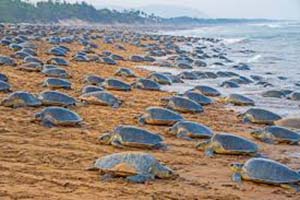
Arribada Vanishes from Pakistani Shores
Arribada the overwhelming natural event recognized as the synchronized mass nesting of thousands of female Olive Ridley sea turtles to lay 100 to 120 eggs, has vanished from Pakistan’s shores. Arribada occurs at particular shorelines across the Pacific Oceans, Atlantic Oceans, and Indian Oceans. Despite confirmed Olive Ridley migration routes near Pakistan, since 2001 the country has not witnessed any nesting in over two decades in Pakistan. Anthropogenic activities combined with environmental factors have contributed to the disappearance of these turtles from Pakistani beaches. Climate change as a potential factor with devastating impact of the Tasman Spirit oil spill in 2003 off Karachi’s coast, this incident severely damaged marine biodiversity. The damage of arribada is a reminder of the delicate balance of marine ecosystems and a missed opportunity for eco-tourism in Pakistan. The Arribada is a prominent natural phenomenon and an indicator of the environmental health in Pakistan.
|
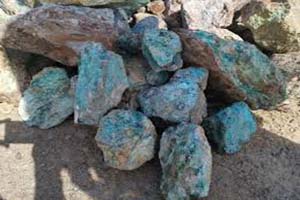
Exporting Raw Copper to Processing Minerals
Pakistan exported Copper Ore, making it the 58th largest exporter of Copper Ore out of 111 in the world, the main exporter countries of Copper Ore are China, Cambodia, United Arab Emirates, and Netherlands. Baluchistan objectives to increase revenue and foster sustainable growth in its mining sector by considering on value-added processing. The Baluchistan Board of Investment and Trade is dynamically looking for Chinese investment to progress in domestic mineral processing and increase value-added copper exports. BBoIT stressed Baluchistan’s rich mineral resources, including copper and gold, and the potential to become a regional mineral processing hub. BBoIT strategies to shift from exporting raw copper to processing minerals within Baluchistan included infrastructure support, generate jobs, guarantee secure returns to attract foreign investors full facilitation, policy support. The goal is to develop local industries and make the most of economic benefits for the province.
|
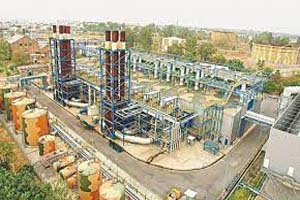
Attock Refinery Signs Agreement with Italian Firm STP
Attock Refinery Limited (ARL) has signed an agreement with STP Studi Tecnologie Progetti, a leading Italian engineering firm to upgrade refinery for Front End Engineering Design (FEED) and Project Management Consultancy (PMC). The agreement was signed by Chief Executive Officer of both ARL and STP. An important revolution in value addition with environment friendly fuel production at Attock refinery limited. The upgradation project of Attock refinery cost estimated up to US$ 600 million, positioning it as one of the most substantial investments in the country’s refining sector and as part of this ambitious upgrade, ARL has already completed Licensor FEED studies for the addition of a Continuous Catalyst Regeneration (CCR) unit with UOP/Honeywell of the United States and the revamp of its Diesel Hydro Desulfurization Unit. The project objects to bring ARL’s operations in line with international fuel standards with improve product quality and condensed environmental footprint.
|

National Tariff Policy 2025–30
During the Regulatory Reforms Conference, draft of the National Tariff Policy (NTP) 2025–30 has been unveiled, with a focus on rationalizing Pakistan’s tariff regime to stimulate industrial productivity, investment, and export competitiveness. Key elements of the policy include phased elimination of Additional Customs Duties over four years and Regulatory Duties and the 5th Schedule over five years. It also proposes a simplified four slabs—0%, 5%, 10%, and 15%—customs duty structure with focused on reducing import costs, especially on raw materials and intermediate goods. The draft policy objects to establish a foreseeable and crystal-clear tariff structure that supports innovation, employment generation, and economic growth. The policy was introduced as part of the Board of Investment’s broader agenda to enhance regulatory efficiency and improve the country’s business climate. The policy also includes incentives for newly emerging environmentally sustainable industries. This policy is building a globally competitive industrial base reforms and are designed to reduce production costs, improve scale, and encourage a shift toward higher value-added exports. Implementation will require close coordination with the Federal Board of Revenue (FBR), Ministry of Industries, and provincial stakeholders to ensure timely execution and sector-wise impact analysis.
|
|
© 2025 Alpine Marine Services Private Limited
all rights reserved
|
|
|